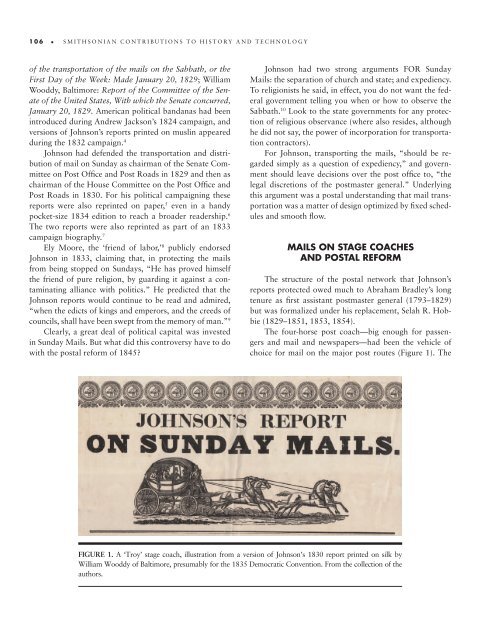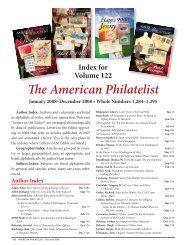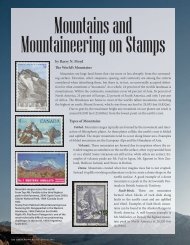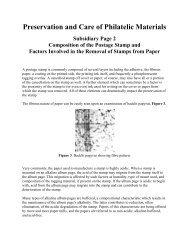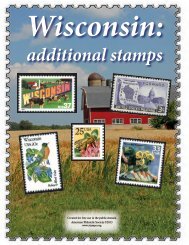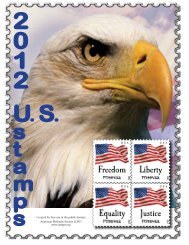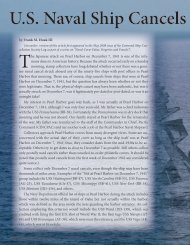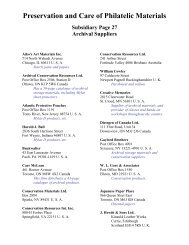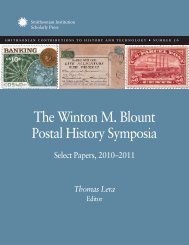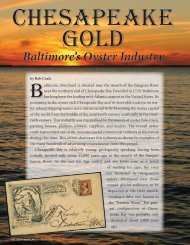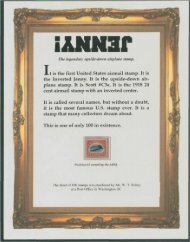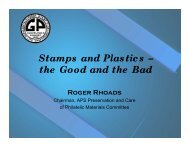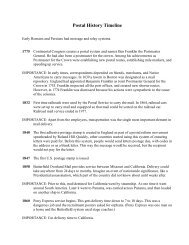The Winton M. Blount Postal History Symposia - Smithsonian ...
The Winton M. Blount Postal History Symposia - Smithsonian ...
The Winton M. Blount Postal History Symposia - Smithsonian ...
- No tags were found...
You also want an ePaper? Increase the reach of your titles
YUMPU automatically turns print PDFs into web optimized ePapers that Google loves.
1 0 6 • s m i t h s o n i a n c o n t r i b u t i o n s t o h i s t o ry a n d t e c h n o l o g yof the transportation of the mails on the Sabbath, or theFirst Day of the Week: Made January 20, 1829; WilliamWooddy, Baltimore: Report of the Committee of the Senateof the United States, With which the Senate concurred,January 20, 1829. American political bandanas had beenintroduced during Andrew Jackson’s 1824 campaign, andversions of Johnson’s reports printed on muslin appearedduring the 1832 campaign. 4Johnson had defended the transportation and distributionof mail on Sunday as chairman of the Senate Committeeon Post Office and Post Roads in 1829 and then aschairman of the House Committee on the Post Office andPost Roads in 1830. For his political campaigning thesereports were also reprinted on paper, 5 even in a handypocket- size 1834 edition to reach a broader readership. 6<strong>The</strong> two reports were also reprinted as part of an 1833campaign biography. 7Ely Moore, the ‘friend of labor,’ 8 publicly endorsedJohnson in 1833, claiming that, in protecting the mailsfrom being stopped on Sundays, “He has proved himselfthe friend of pure religion, by guarding it against a contaminatingalliance with politics.” He predicted that theJohnson reports would continue to be read and admired,“when the edicts of kings and emperors, and the creeds ofcouncils, shall have been swept from the memory of man.” 9Clearly, a great deal of political capital was investedin Sunday Mails. But what did this controversy have to dowith the postal reform of 1845?Johnson had two strong arguments FOR SundayMails: the separation of church and state; and expediency.To religionists he said, in effect, you do not want the federalgovernment telling you when or how to observe theSabbath. 10 Look to the state governments for any protectionof religious observance (where also resides, althoughhe did not say, the power of incorporation for transportationcontractors).For Johnson, transporting the mails, “should be regardedsimply as a question of expediency,” and governmentshould leave decisions over the post office to, “thelegal discretions of the postmaster general.” Underlyingthis argument was a postal understanding that mail transportationwas a matter of design optimized by fixed schedulesand smooth flow.Mails on Stage Coachesand <strong>Postal</strong> Reform<strong>The</strong> structure of the postal network that Johnson’sreports protected owed much to Abraham Bradley’s longtenure as first assistant postmaster general (1793–1829)but was formalized under his replacement, Selah R. Hobbie(1829–1851, 1853, 1854).<strong>The</strong> four- horse post coach—big enough for passengersand mail and newspapers—had been the vehicle ofchoice for mail on the major post routes (Figure 1). <strong>The</strong>Figure 1. A ‘Troy’ stage coach, illustration from a version of Johnson’s 1830 report printed on silk byWilliam Wooddy of Baltimore, presumably for the 1835 Democratic Convention. From the collection of theauthors.


